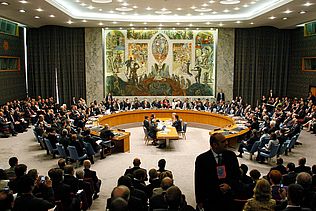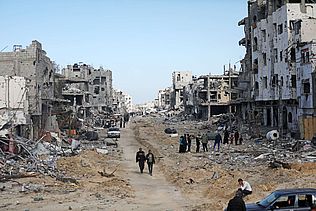By the looks of it, the German public has become accustomed to the next war, the next horror, more than 100 days after the Hamas attacks and the start of the Israeli bombardment of Gaza. But the power of habit does not change facts that can hardly be disputed: Through its political backing, arms deliveries and the blockade of international legal mechanisms, the German government, like the West as a whole, is participating in serious breaches of international humanitarian and human rights law committed by the Israeli army in Gaza. For more than three months, they have been complicit in several ways. The reverse side of the publicly practised military solidarity with Israel's government is the total failure of German foreign policy.
This has significant consequences: German policy and its obvious ethical incoherence, which can no longer be adequately described even with the word double standards, are being closely observed and sharply criticised by intellectuals, governments, civil society and anti-colonial movements worldwide. The damage already done not only on a geopolitical and intergovernmental level, but also in the everyday professional business of foundations, cultural institutions and global civil society cooperation, is dramatic. The long-term consequences are incalculable. Western support for the war against a population that has been trapped in Gaza for almost two decades, but also the authoritarian state measures in Germany against Palestinian and increasingly also left-wing Jewish voices, mark a turning point whose historical dimension can no longer be denied.
The latest highlight is the scandalous position of the German government on the proceedings against Israel at the International Court of Justice in The Hague. The South African government and jurisprudence have already made history in the Peace Palace, the seat of the court. Representatives of their legal system, equipped with a profound knowledge of apartheid and racism, have brought charges against the state of Israel before the UN court for its actions in the Gaza Strip. South Africa's role is highly symbolic due to the formal end of apartheid 30 years ago: In the cast at The Hague, South Africa also embodies the world's hope for an end to racism, an end to colonial paternalism, historical justice and the common horizon of human rights par excellence.
For three hours, the lawyers spoke, explained and showed footage of what the world should not see and forget as quickly as possible: The number of deaths, which has now become a daily and predictable statistic. The ruthlessness of Israel's actions against children, the elderly and the sick. The destruction of all livelihoods of the population. The targeted starvation and dehydration. The expulsion of two million people whose return seems impossible for years, if not decades, in view of the destruction and unexploded ordnance left behind. Israel, on the other hand, defended itself before the court as it would on the battlefield. Its "security" is defined by maintaining total superiority over the Palestinian population. It is a question of time before this superiority turns into impotence in the face of lacking political prospects.
A slap in the face of international law
The German announcement to intervene in favour of Israel in the event of a full trial is a clear signal to South Africa, the International Court of Justice and the world: international law is either the prerogative of the West – or there must be no international law. This means that all of the German government's statements about a foreign policy based on values and rights are not worth the paper they are written on. The increasing credibility and legitimacy problem of international law and its institutions, which many perceive as Western and biased, is aggravated further. The message thus points far beyond the Gaza conflict: apparently, the law is only supposed to apply when it approves of the right of the strongest. And Germany is taking the side of the right of the strongest and pretending it to be a contribution to a "never again" in the guise of remembrance politics. This absurdity is what makes Germany and large parts of the West so lonely in today's multipolar world.
It was a coincidence that court in The Hague began the hearing on the 120th anniversary of the Herero uprising in what is now Namibia. However, a shocking connection immediately emerges. In response to a costly attack on German settlers by Herero fighters on 12 January 1904 and in the days that followed, the "Imperial Schutztruppe for German South-West Africa" committed the first genocide of the 20th century. From a Namibian perspective, the history of the Herero uprising and its consequences, despite all the differences, hangs like a blueprint over the horrific events since the Hamas attack on 7 October. The Namibian government immediately and sharply criticised the German reaction to the court proceedings.
The doggedness with which German politics refuses to recognise the parts of Israel's settlement and oppression policy that are reminiscent of colonial history undoubtedly has to do with the country's failure to come to terms with its own crimes. And yet Germany should have a record of this: A country that is responsible for two genocides in modern history must take note of and scrutinise every serious accusation of genocidal intent with the utmost seriousness and humility.
Nevertheless: a glimmer of hope
However, South Africa's appearance before the International Court of Justice has shown that there is an alternative, even without Germany's support. This is and remains the power of international law and human rights. Institutions such as the International Court of Justice and later the International Criminal Court were created for this purpose in the wake of the experience of the Second World War and the Holocaust. Backed by international law, they can demand an end to atrocities and hold those responsible to account. And namely for all victims of this horror on both sides of the border. The region will only have a future if impunity is ended and justice served.
The political elite's commitment to the prevailing Israeli understanding of security, which has always been based on the law of the jungle, and which has been declared the German raison d'état, is revealed for what it is: a policy of coercion that does not allow for any other political, legal, philosophical or historical position. In this respect, it is difficult to continue speaking of democracy, certainly not of politics, if one understands it in the unconditional sense of Hannah Arendt as a decision of collective free will.
The indifference of German politics towards what is happening in Gaza, in the shadow of which the project for further Israeli colonisation is also being radically advanced, makes the German government an untrustworthy player in the region. Never has the appealing recourse to the two-state solution sounded as empty as it does now. Behind all the empty phrases, the intention to get the powerless public used to crimes that seem necessary for the preservation of the status quo of Germany and the West remains barely concealed.
medico international on 18 January 2024




